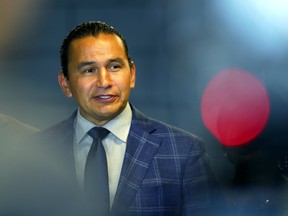Education
Manitoba Government Faces Criticism Over Education Focus

The Manitoba government has announced a new education initiative aimed at developing a “climate change education framework.” This program, presented by Ministers Mike Moyes and Tracy Schmidt, seeks to prepare young people for environmental stewardship, enhance “climate literacy,” and connect sustainability to everyday life. While these goals may seem commendable, critics argue that this focus reflects a preference for social engineering over essential life skills education.
Opponents, including Kevin Klein, a Manitoba MLA, contend that students are graduating without mastering fundamental financial skills. They emphasize that while the government promotes the role of a “climate educator in residence” and has established a Youth Advisory Council to shape climate policy, many students lack knowledge in areas such as budgeting, debt management, and basic household finance. The criticism highlights a disconnect between the government’s emphasis on climate issues and its ability to address pressing economic realities, particularly in a province struggling with rising debt.
The government’s commitment to sustainability is questioned, especially when Manitoba continues to face financial challenges. Critics point out that the administration has a history of expanding bureaucracies and funding projects that do not reflect the immediate needs of its citizens. The healthcare system, which was a significant promise during the government’s campaign, remains under strain, with emergency rooms overwhelmed and staffing shortages persisting.
As Klein articulates, “If this is what ‘real-world impact’ looks like, it is hard to be inspired.” He argues that education should equip students with the tools necessary for independent living, rather than preparing them solely for activism. The pressing need for practical skills such as budgeting, understanding interest rates, and managing taxes is highlighted as vital for fostering capable adults.
Many parents echo similar sentiments, emphasizing the importance of teaching their children basic life skills. These include financial literacy, the ability to perform basic home repairs, and even first aid. Critics assert that while environmental education is essential, it should not come at the expense of personal responsibility and practical knowledge.
The current educational framework, according to Klein, prioritizes political messaging over critical life skills. He insists that classrooms should focus on empowering students with practical knowledge rather than conditioning them to repeat government slogans. This misalignment, he argues, leads to graduates who may understand climate issues but lack the financial acumen necessary to navigate adulthood.
The push for a more balanced curriculum extends to addressing substance abuse, which remains a significant issue in many communities. Klein notes that while the government celebrates new councils and initiatives, the silence surrounding substance abuse education in schools can have dire consequences. He emphasizes that meaningful discussions about narcotics and alcohol are essential to tackling the challenges faced by families and communities across Manitoba.
Klein’s call for a shift in educational focus highlights a broader concern about the effectiveness of the government’s initiatives. While the administration pushes for ideological projects, critics argue that the basics of education—financial literacy, personal responsibility, and practical skills—are being overlooked.
As this debate unfolds, the question remains: How can the Manitoba government better prepare its students for the future? Klein advocates for an education system that prioritizes essential life skills, arguing that such an approach would contribute more substantially to a sustainable future than any symbolic framework.
In a province where many graduates leave school unprepared for the financial realities of adulthood, the need for a curriculum that promotes self-sufficiency and responsibility is more critical than ever. Manitobans deserve an education system that empowers their children to thrive—both financially and personally.
-

 Education3 months ago
Education3 months agoBrandon University’s Failed $5 Million Project Sparks Oversight Review
-

 Science4 months ago
Science4 months agoMicrosoft Confirms U.S. Law Overrules Canadian Data Sovereignty
-

 Lifestyle3 months ago
Lifestyle3 months agoWinnipeg Celebrates Culinary Creativity During Le Burger Week 2025
-

 Health4 months ago
Health4 months agoMontreal’s Groupe Marcelle Leads Canadian Cosmetic Industry Growth
-

 Science4 months ago
Science4 months agoTech Innovator Amandipp Singh Transforms Hiring for Disabled
-

 Technology4 months ago
Technology4 months agoDragon Ball: Sparking! Zero Launching on Switch and Switch 2 This November
-

 Education4 months ago
Education4 months agoRed River College Launches New Programs to Address Industry Needs
-

 Technology4 months ago
Technology4 months agoGoogle Pixel 10 Pro Fold Specs Unveiled Ahead of Launch
-

 Business3 months ago
Business3 months agoRocket Lab Reports Strong Q2 2025 Revenue Growth and Future Plans
-

 Technology2 months ago
Technology2 months agoDiscord Faces Serious Security Breach Affecting Millions
-

 Education4 months ago
Education4 months agoAlberta Teachers’ Strike: Potential Impacts on Students and Families
-

 Science4 months ago
Science4 months agoChina’s Wukong Spacesuit Sets New Standard for AI in Space
-

 Education3 months ago
Education3 months agoNew SĆIȺNEW̱ SṮEȽIṮḴEȽ Elementary Opens in Langford for 2025/2026 Year
-

 Technology4 months ago
Technology4 months agoWorld of Warcraft Players Buzz Over 19-Quest Bee Challenge
-

 Business4 months ago
Business4 months agoNew Estimates Reveal ChatGPT-5 Energy Use Could Soar
-

 Business4 months ago
Business4 months agoDawson City Residents Rally Around Buy Canadian Movement
-

 Business4 months ago
Business4 months agoBNA Brewing to Open New Bowling Alley in Downtown Penticton
-

 Technology2 months ago
Technology2 months agoHuawei MatePad 12X Redefines Tablet Experience for Professionals
-

 Technology4 months ago
Technology4 months agoFuture Entertainment Launches DDoD with Gameplay Trailer Showcase
-

 Technology4 months ago
Technology4 months agoGlobal Launch of Ragnarok M: Classic Set for September 3, 2025
-

 Technology4 months ago
Technology4 months agoInnovative 140W GaN Travel Adapter Combines Power and Convenience
-

 Top Stories3 months ago
Top Stories3 months agoBlue Jays Shift José Berríos to Bullpen Ahead of Playoffs
-

 Science4 months ago
Science4 months agoXi Labs Innovates with New AI Operating System Set for 2025 Launch
-

 Technology4 months ago
Technology4 months agoNew IDR01 Smart Ring Offers Advanced Sports Tracking for $169










